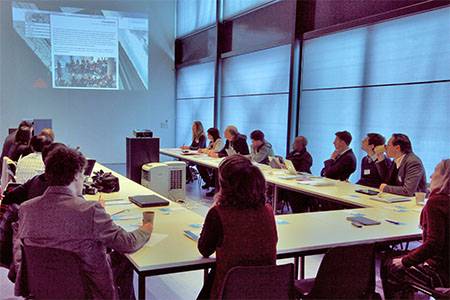International network of urban laboratories addressing critical questions facing built environment education.

The UCL Urban Laboratory is a partner of the URBAN LAB+ international network of urban laboratories. The network provides a platform for dialogue and cooperation between various international 'urban laboratories' involved in higher education as well as local urban development processes - from Europe as well as from major regions of urban growth in South Africa, Asia, and Latin America.
Within the context of a world becoming increasingly more urban with a seemingly ever-growing number and magnitude of urban challenges, several higher education institutions across the world have in recent years established 'urban laboratories'. Their aim is to expand and strengthen their competencies in the realms of architecture, urban planning and other built environment disciplines in order to respond to the complex challenges associated with today's 'urban age'. While by no means uniform in regard to their approaches or objectives, urban laboratories often share that they are dedicated to a synthesis of education, research and a combined focus on theory and practice. They focus on connecting the intellectual and disciplinary resources of the academy with the practical spheres of architecture, urban design and planning as well as municipal institutions, and bring students into direct contact with the manifold challenges their cities and other urban environments face and providing opportunities – such as interdisciplinary design studios – in which they can make use of their skills.
The network is led by the Habitat Unit at Technische Universität Berlin, with initial funding of €373,372 awarded for the network to run from 2013 to 2015 under Erasmus Mundus Programme Action 3.
Activities focused on enhancing urban teaching and research, and included joint symposia, workshops, faculty exchange and hands-on projects. These are structured around three clusters; interdisciplinarity, global education, and exchanges between academic researchers and built environment professionals.
The eight partners are:
- CUBES Centre for Urbanism & Built Environment Studies: University of the Witwatersrand, South Africa
- Kamla Raheja Vidyanidhi Institute for Architecture and Environmental Studies: India
- Laboratoire Bâle, laba: École Polytechnique Fédérale de Lausanne, Switzerland
- Observatorio de Ciudades: Pontificia Universidad Catolica de Chile
- School of Architecture: The Chinese University of Hong Kong
- UCL Urban Laboratory: University College London, UK
- Urban Design Lab: Università della Calabria, Italy
- Urban Research and Design Laboratory: Technische Universität Berlin, Germany
Key outputs from the network include Urban Pamphleteer #5: Global Education for Urban Futures, the Turning Tables exhibition at the 15th International Architecture Exhibition of La Biennale di Venezia, and a major international conference 'Global Urban Higher Education: the challenges and potentials of internationalisation' hosted at UCL in September 2015.
For further information please contact Dr Ben Campkin (b.campkin@ucl.ac.uk) or Dr Andrew Harris (andrew.harris@ucl.ac.uk) who are leading UCL's involvement in the network.
 Close
Close

